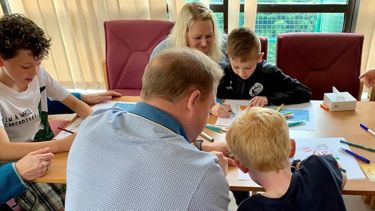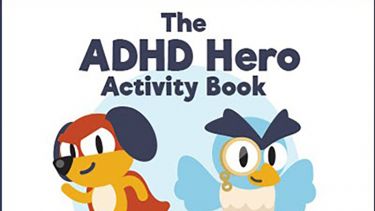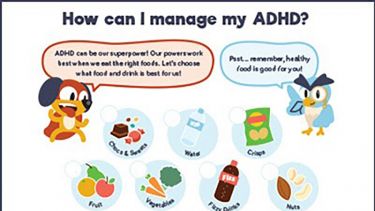Psychoeducation and paediatric neurodisabilities
Psychoeducation for children and young people with Attention Deficit Hyperactivity Disorder (ADHD).

Project summary
The School of Education’s Dr Lauren Powell has collaborated with the University of Derby, NIHR’s Children and Young People Medtech Cooperative (CYPTECH) and Sheffield Hallam University’s Lab4Living to co-design a psychoeducational resource to help primary aged young people with ADHD learn about and manage their condition.
Whilst psychoeducation interventions are recognised as being beneficial for this group and recommended by UK clinical guidelines, there is little age-appropriate material currently available.
Children and young people with ADHD, their parents, clinicians, educational professionals, charities, and academics, have been central to the project throughout; from identifying the unmet need, to co-designing the content of the resource, to testing and developing initial prototypes.
The activity book has now been adopted by several schools’ charities and NHS Trusts and Councils across the UK.
The ADHD Activity Book (Online PDF)
Psychoeducation for autistic children and young people
Funding has also been gained from the ESRC Impact Accelerator fund to adopt the same methodology as stated above to co-design a resource for primary-aged young autistic people who attend a mainstream school.
This resource has been underpinned by systematic review evidence and a formal evaluation with stakeholders, autistic children and their families. This work is currently under review. The Learning about autism online resource however is now available via the ADHD Foundation website.
Psychoeducation for teenagers with ADHD
Dr Powell is collaborating with colleagues at Loughborough University to look at the information needs of this population with the intention to provide a resource for this population in the future. They are also exploring the potential for exploring the potential of this work to benefit young people with ADHD who leave school and transition to University as evidence suggests this population are less likely to continue with their studies than those who do not have ADHD.
Psychoeducation for education professionals working with autistic children
Dr Powell is also working alongside a former MSc student from the University of Sheffield’s School of Education to learn about the needs of teachers in mainstream school with regards to learning about supporting autistic children in their classroom. The aim was to find out what they already knew, what they felt they needed to know and what styles and modes of resources they felt would be helpful for their profession. Dr Powell and the former student are now working towards publishing this work.
Psychoeducation and paediatric Obsessive Compulsive Disorder (OCD)
White Rose ESRC funding has been gained for Elizabeth Colbert to study a PhD, supervised by Dr Lauren Powell and Dr Anna Weighall. The PhD started in September 2023 and will aim to co-design a resource for teachers working with young people with OCD. The resource will aim to help teachers understand what OCD is, what it can look like in children and young people and how to support this population in the classroom.
For further information visit the project webpage, Improving teacher awareness and understandings of paediatric obsessive- compulsive disorder (OCD) through a co-designed psychoeducational resource.
Exploring the lived experience of females with ADHD
Dr Powell is working with three former MSc Psychology and Education (Conversion) students to publish their excellent dissertations that explored the under-studied female experience of having ADHD in adults. This work has revealed the challenges faced by the population as well as highlighting the positive characteristics this population attribute to their ADHD. Something the group is passionate about raising awareness of - the fact that neurodisabilities can be viewed in a positive light!
Safety Nets
Dr Powell provides consultation on this multicenter study exploring the effectiveness of an intervention combining physical exercise with education for children and young people on the waiting list for treatment with child mental health services. She is also an author on a service evaluation of this work and further supporting qualitative work for this is under review.
If you would like to learn more about any of these projects, contact Dr Lauren Powell.


